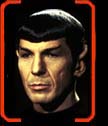 |
 |
 1964 series pilot 'The Cage' introduces Gene Roddenberry's Star Trek
concept, but the show is quite different from the one that would
eventually hit the screens two years later.
1964 series pilot 'The Cage' introduces Gene Roddenberry's Star Trek
concept, but the show is quite different from the one that would
eventually hit the screens two years later.
The plot reads like standard 'Original Series' fare. The Enterprise, led
by Captain Christopher Pike (played with a very stony face by Jeffrey
Hunter) answers a distress call from colonists on the planet Telos IV.
Beaming down, Pike is lured into a trap by the Talosians, and must find
a way of escaping.
The key elements that signpost Star Trek in the minds of most TV
viewers are missing from The Cage. Bones, Scotty, Sulu and Uhura are not
on the ship. Jeffrey Hunter's Captain Pike is weary, introspective and
subdued, rather than swashbuckling, macho and hormonal. Most of all, the
atmosphere of this Trek is different: it's contemplative, edgy and
strangely cold.
Reaction to the pilot was ambivalent. NBC applauded its technical
superiority, but argued that its multi-layered story would not deliver a
large TV audience. After working on the pilot for two years, Roddenberry
was told to start again. The strange thing is, the network - for once -
were probably right. 'The Cage' is an intelligent piece of television, but
it's also very slow - too slow for Star Trek.
The pilot is not helped by its distinct lack of action, nor by Spock's
ridiculous, near-vertical eyebrows, nor - most significantly of all -
by the charisma-free zone that is Jeffrey Hunter. If the role of the
captain had not needed to be recast due to Hunter's later acting
commitments, Star Trek would probably not have lasted one series, never
mind 36 years. The chemistry brought by the Kirk/Spock/Bones axis,
so glaringly missing here, proves by its omission to be one of the key
secrets of the series' popularity.
But it's easy to forget both how radical the Star Trek concept was at the time 'The Cage' was made, and the consistent quality of this individual episode. Before the pilot, there had been no hour-long TV sci-fi TV series with ongoing characters. 'The Cage', for its genre, was defiantly sophisticated. Even viewed today, the production values are impressive, on a par with 50s big budget sci-fi films such as 'Forbidden Planet' (from which the episode borrows some elements of its style and storyline).
There are also unique aspects of 'The Cage' that lend it a strange credibility. The sense that the Enterprise is a ship exploring "where no man has gone before", on the fringes of the galaxy, is arguably more effectively conveyed here than it is in any subsequent episode. The utilitarian, militaristic sets - in particular the bridge - add to this feeling of risk and adventure. And, in an extremely bold move for the
time, the second-in-command is a woman: Majel Barrett, Roddenberry's girlfriend of the time, gives a memorable performance as the glacial Number One.
The network's demand for more action and adventure resulted in the second pilot, the classic 'Where No Man Has Gone Before', in 1966. Gene Roddenberry: "The network told me to get rid of Number One, the woman first lieutenant, and also to get rid of 'the Martian fellow'�meaning, of course, Spock. I knew I couldn't keep both, so I gave the stoicism of the female officer to Spock, and married the actress who played Number One."
This, combined with the hiring of William Shatner and DeForest Kelley, arguably guaranteed Star Trek its success. 'The Cage' makes for fascinating viewing, even if simply to see what Star Trek could have been and - perhaps thankfully - was not.
|
 |
 |
